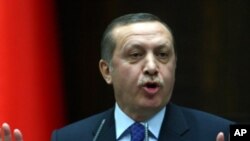Turkey's prime minister has called for the immediate establishment of humanitarian aid corridors in Syria. The call comes as Damascus intensifies its crackdown on the opposition.
In his weekly address to parliamentary deputies, Turkish Prime Minister Recep Tayyip Erdogan slammed Syria's bloody crackdown on dissent as inhumane savagery, and called for immediate assistance to the growing number of refugees.
Mr. Erdogan demanded that humanitarian aid corridors be established immediately. He said the international community should impose pressure on Damascus so that aid can be delivered to the people of Syria, especially in the city of Homs. Mr. Erdogan said the Arab League plan should be implemented without further delay or loss of lives.
It is the first time Ankara has called for the establishment of humanitarian corridors, as tensions escalate between Turkey and its neighbor. The corridors are to provide refugees a safe route out of Syria and unimpeded access to relief agencies.
Damascus has severely restricted access and movement of humanitarian groups. There are also reports that Syrian security forces have attacked refugees fleeing the fighting. But Turkish Foreign Minister Ahmet Davutoglu last month warned any such corridors would need to be protected.
International relations expert Soli Ozel of the newspaper Haberturk says while Ankara strongly backs the opposition, it is still wary of the risks of creating humanitarian corridors. "How do you do it? Do you send troops and face the Syrian army? I don't think the Turks are really [interested] in that," he said.
Turkey has until now said that the United Nations should sanction any intervention. But with China and Moscow last month vetoing a U.N. Security Council motion condemning Damascus, Ankara is increasingly questioning the role of the U.N. With Syria's crackdown intensifying and moving north towards resistance strongholds close to the Turkish border, concerns are growing in Turkey that it could face a major refugee influx.
Turkish Foreign Ministry spokesman Selcuk Unal said, "Another concern that one day things go out of control there could a refugee [in]flux to Turkey, but of course we welcome all the Syrian nationals who want to escape from persecution."
Turkey says it is already giving refuge to 11,000 Syrians. But Ankara has warned if those numbers dramatically increase, it will be forced to act. Later this month, Istanbul will host the next meeting of the "Friends of Syria," a group of around 70 countries supporting the Syrian opposition. Humanitarian corridors are expected to be on the agenda of the forum.




